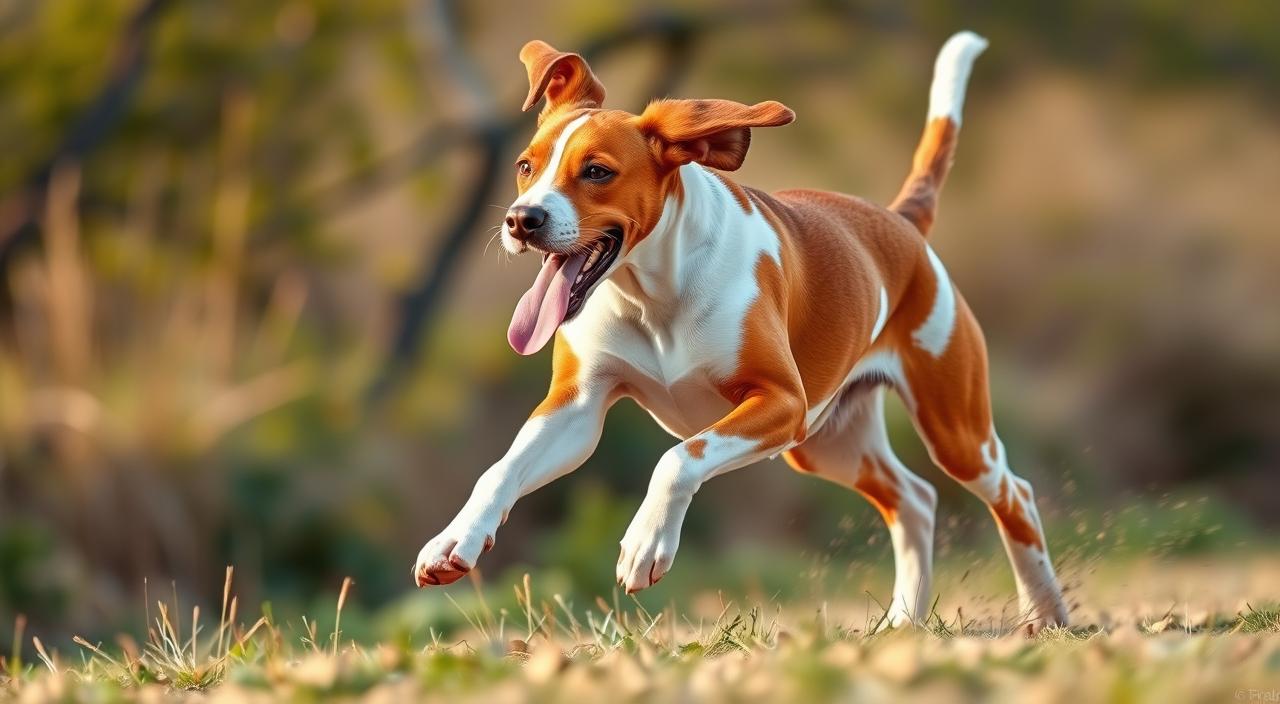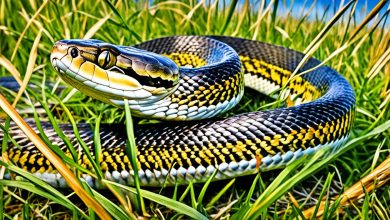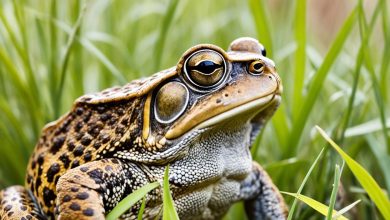The Brittany is a compact, muscular gundog with impressive stamina. It can run up to five miles during a brisk hike. This energetic breed was formerly known as the Brittany Spaniel.
Hunters love the Brittany for its endurance, versatility, and eager-to-please attitude. It hails from the Brittany region of northwestern France. The breed combines an athletic build with a cheerful temperament.
The Brittany makes an excellent hunting partner and affectionate family companion. It’s ideal for active households who enjoy outdoor adventures.
The Brittany: A Compact yet Energetic Sporting Dog
Origins and Physical Characteristics
The Brittany is a medium-sized sporting breed from France. It’s known for its dense white and orange coat. This agile gundog stands 17.5 to 20.5 inches tall and weighs 30 to 40 pounds.
The Brittany has a flat or wavy coat. It comes in white with orange or reddish-brown markings. These stylish dogs are popular for bird hunting on both sides of the Atlantic.
Versatile Hunting Companion
The Brittany was bred to be a versatile gundog. It excels at both pointing and retrieving in various country environments. This makes it a valuable hunting companion.
The breed’s exact origins are unclear. However, it likely descends from English setters, Welsh springer spaniels, and French spaniel breeds. These dogs contributed to the Brittany’s unique traits and abilities.
| Characteristic | Description |
|---|---|
| Average Height | 17.5-20.5 inches |
| Average Weight | 30-40 pounds |
| Life Expectancy | 10-13 years |
| Coat | Dense, flat or wavy, in combinations of white and orange or reddish-brown |
| Breed Origins | Developed in France, believed to have contributions from English setter, Welsh springer spaniel, and French spaniel breeds |
The Brittany is a compact, energetic, and versatile hunting dog. It’s a favorite among bird hunters and sporting enthusiasts. This breed combines skill and companionship in a lovable package.
Brittany Dog: A Breed with a Rich History
The Brittany dog, or epagneul breton, has a fascinating history spanning centuries. These versatile hunting dogs were prized in medieval France. Hunters and poachers alike valued their all-around capabilities in the Brittany region.
In the 1850s, English gentry brought well-trained hunting dogs to Brittany. These included Pointers and various Setter breeds. This introduction helped shape the Brittany’s distinctive look and skills.
Local Spaniel-type dogs were likely bred with these imported breeds. This mix resulted in the variety of coat colors seen in modern Brittanys.
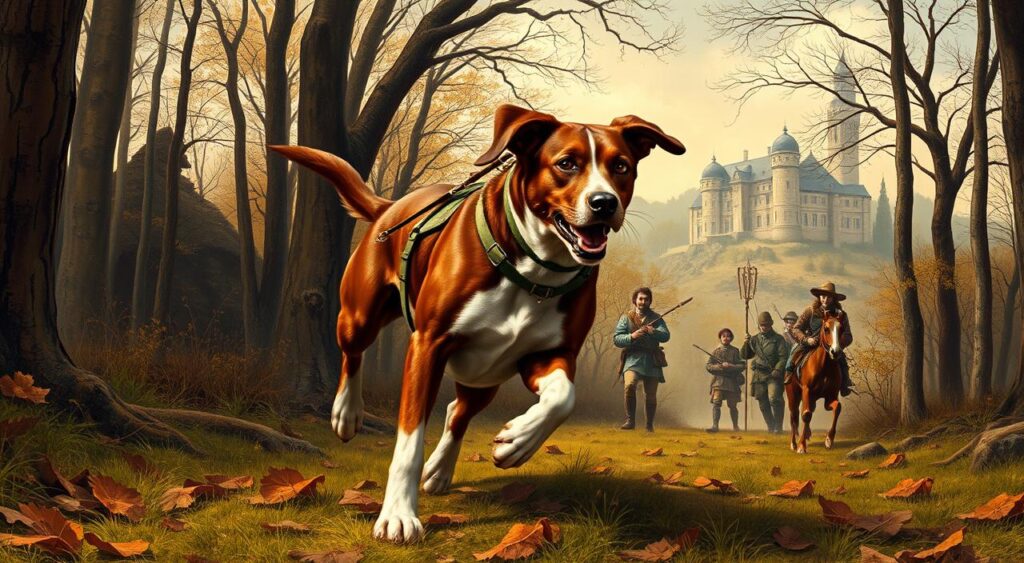
The Brittany breed was officially recognized in 1907. A breed club formed in Loudeac, France. They drafted a breed standard, which the Société Centrale Canine approved.
After World War I, Brittanies became incredibly popular in France. Hunters eagerly sought after these skilled dogs. By the 1930s, the Brittany breed had reached the United States.
American sportsman Louis Thebaud imported Brittanys to the US. In 1936, he formed the Brittany Spaniel Club of North America. Since then, Brittanys have become beloved family pets.
| Breed Fact | Value |
|---|---|
| Average Litter Size | 5 puppies |
| Life Span | 11.1–12.6 years |
| Weight Range | 30–45 lb (14–20 kg) |
| Height Range | 17-1/2 to 20-1/2 inches (44-52 cm) |
The Quintessential Upland Game Bird Hunter
Brittanys are ideal upland game bird hunters. They have natural agility, strength, and an exceptional sense of smell. These dogs excel at flushing and retrieving game birds with ease.
Brittanys are compact yet energetic. They’re perfect versatile gundogs for hunters. These dogs stay within range while navigating thick brush without getting stuck.
Excelling in Field Sports and Agility
Brittanys shine in field sports. Their intelligence, trainability, and endless stamina make them stand out. These dogs excel in flyball, Diving Dogs, and agility competitions.
Brittanys have earned over 500 Dual Champion titles. This makes them the top Sporting Group breed in this category. The title recognizes dogs that are both Show and Field Champions.
| Top 10 Best Grouse Hunting Dogs | Breed Characteristics |
|---|---|
| English Setter | Classic choice for traditional-minded grouse hunters, with variations ranging from low-to-the-ground field-trial type to tall, extravagantly coated types. |
| Gordon Setter | Known as the “black-and-tan,” valued for its steady, level-headed work style and close-range operation. |
| Pointer | Seen as the speedsters of the pointing-dog set, eliciting strong opinions from bird-dog enthusiasts. |
| German Wirehaired Pointer/Drahthaar | Recognized for their hardworking nature, tenacity, and exceptional ability to find dead and crippled birds. |
| German Shorthaired Pointer | Described as low-maintenance, tough, birdy, biddable, and heat-tolerant, making them a versatile choice for grouse hunting. |
| Labrador Retriever | Acknowledged for their utility in various upland game bird hunts, including being effective in hunting ruffed grouse. |
| Golden Retriever | Portrayed as high-energy dogs that are eager to please in hunting scenarios. |
| English Cocker Spaniel | Highlighted as dynamic dogs with high levels of enthusiasm and excitement when hunting grouse, being referred to as “pocket rockets.” |
| English Springer Spaniel | Portrayed as versatile flushing dogs, suitable for a range of upland game bird hunts, including grouse hunting. |
Brittanys are exceptional upland game bird hunters. Their skills and popularity in dog sports make them stand out. These dogs captivate hunters and enthusiasts with their natural talents and boundless energy.
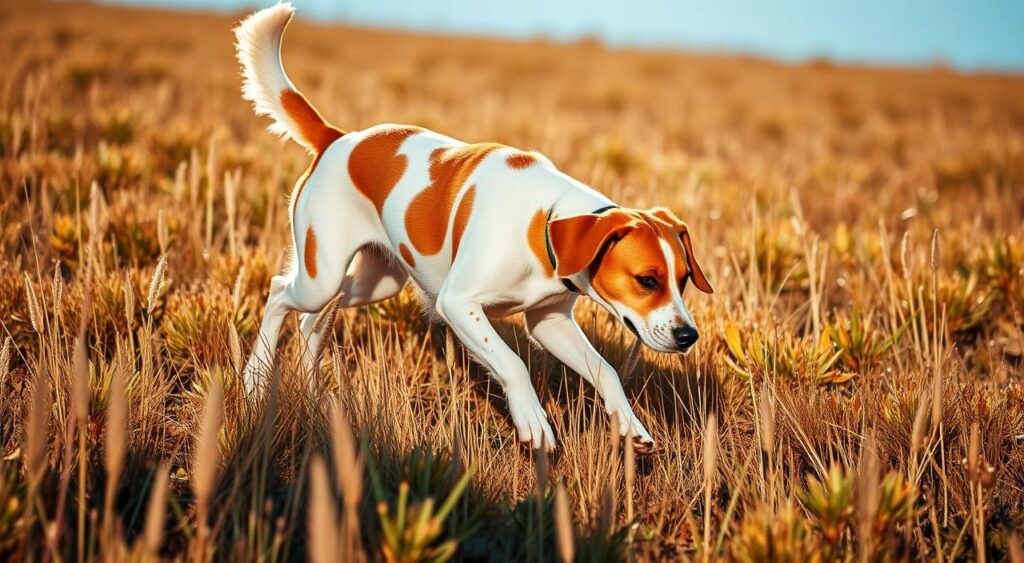
Friendly and Affectionate Family Companion
Brittany dogs are gentle and patient, making them perfect family pets. These energetic canines thrive in active households. They offer companionship and loyalty to their owners.
Gentle Nature and Patient Temperament
Brittanys respond best to positive reinforcement and patient training. They need a calm, nurturing environment. Harsh words or raised voices can upset them.
These dogs make wonderful family companions, especially for active households with children. Their gentle nature and eagerness to please shine through in their interactions.
Brittanys are known for their patience and tolerance. They enjoy playing with their human family members. Their gentle demeanor ensures a safe environment for children.
| Trait | Description |
|---|---|
| Temperament | Gentle, patient, and sensitive |
| Suitability as Family Pet | Excellent, thrives in active households with children |
| Training Approach | Positive reinforcement, avoiding harsh words or raised voices |
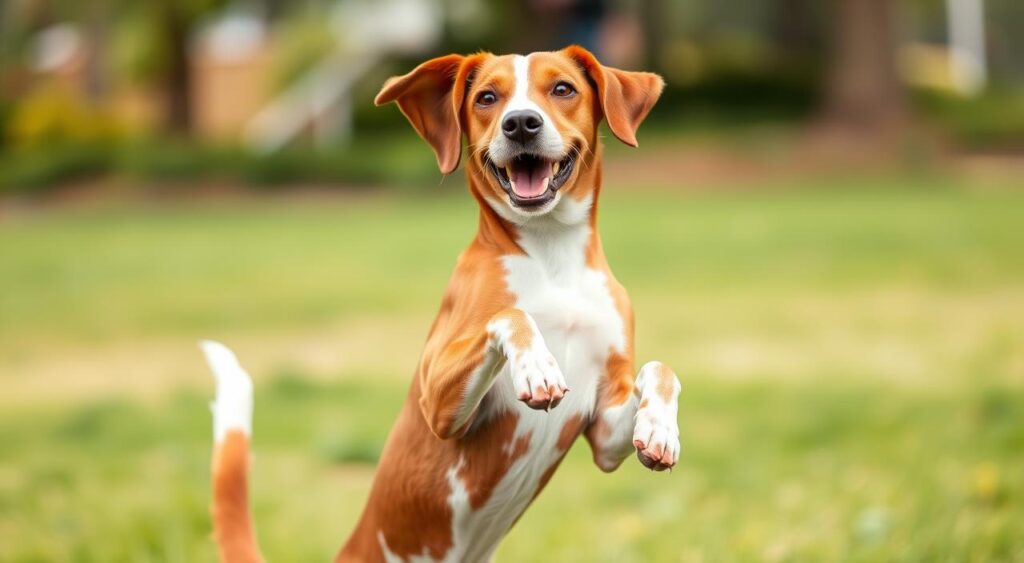
The Brittany’s friendly nature makes it an ideal family companion. These energetic and loyal dogs fit well in active households. With proper care, they become wonderful additions to any family.
High Energy Levels and Exercise Needs
Brittany dogs are known for their high energy and need for vigorous exercise. These athletic, compact sporting dogs thrive on active lifestyles. They often need at least an hour of intense physical activity daily.
Owners say Brittanys are especially energetic before age 2. Regular exercise is crucial to manage their enthusiasm and prevent behavioral issues. Activities like walks, runs, bike rides, and off-leash play help channel their hunting instincts.
Male Brittanys often have a higher drive for hunting and need more exercise than females. Individual energy levels can vary. Owners who embrace brittany dog exercise needs often improve their own fitness and weight management.
| Exercise Recommendation | Time Needed |
|---|---|
| Daily Walks | At least 2 miles |
| Occasional Runs or Bike Rides | 30-60 minutes |
| Off-Leash Play Sessions | 30-60 minutes |
| Hunting or Searching Activities | Varies, but mentally stimulating |
The high energy levels of Brittanys are key to their care. A tired Brittany is often happy and well-behaved. With the right vigorous exercise routine, these athletic companions can thrive.

Intelligent and Eager to Please
Brittany dogs are smart and love to please their owners. They’re easy to train with gentle, positive methods. Early socialization is key to prevent timidity in these sensitive pups.
These energetic companions thrive in calm households with consistent training. They excel at obedience and agility when trained positively. Brittanys don’t do well in stressful environments.
Proper socialization builds confidence in young Brittanys. It helps ease shyness and submissive behaviors. Exposing them to various people and experiences creates well-rounded companions.
Brittanys have strong hunting instincts and need thorough training. Commands like “come” and “stay” keep them safe in the field. Gentle training and socialization bring out the best in these dogs.
Grooming and Coat Care for the Brittany
Brittanys have a medium-length, dense coat that needs regular grooming. Weekly brushing helps control shedding and keeps the coat healthy. Though often called “wash-and-wear,” these dogs still require consistent care.
Owners can groom their Brittanys at home or visit a professional. Groomers can trim hair around the neck, ears, and pasterns for a sleeker look. For Brittanys with white coats, a dog whitening shampoo helps maintain brightness.
Dental care is crucial for Brittanys. Brush your dog’s teeth two to three times weekly. This prevents tartar buildup and promotes good oral health.
Grooming Essentials for the Brittany
- Weekly brushing to control shedding and maintain coat health
- Occasional professional grooming to trim hair around the neck, ears, and pasterns
- Use of a dog whitening shampoo for Brittanys with a lot of white in their coat
- Teeth brushing two to three times per week to promote dental hygiene
| Grooming Task | Frequency | Recommended Tools |
|---|---|---|
| Brushing | Weekly | Slicker brush, undercoat rake |
| Trimming | 4-6 weeks before a show | Thinning shears, curved scissors |
| Bathing | As needed | Dog whitening shampoo |
| Nail Trimming | Monthly | Nail clippers, Dremel tool |
| Ear Cleaning | Weekly | Ear cleaning solution, cotton balls |
Follow these brittany dog grooming and coat care tips for a healthy, well-groomed pup. Regular weekly brushing and occasional dog whitening shampoo use will keep your Brittany looking its best.
Brittany Dog: Energetic Sporting Breed Overview
The Brittany is a medium-sized sporting breed from France. It’s known for its white and orange coat. This versatile gundog excels in bird-hunting and has high energy levels.
Brittanys thrive on activities like running, hiking, or biking. Young Brittanys may dig or chew if they don’t get enough exercise. Regular physical activity is crucial for this breed.
These dogs are eager to please and affectionate towards their owners. They tend to roam off-leash, exploring their surroundings. Brittanys are naturally drawn to squirrels, rabbits, and birds.
Leash-training Brittanys can be challenging due to their love for running. The Easy Walk harness and retractable leashes have shown some success. They interact well with other dogs and are suitable for therapy work.
Brittanys are perceptive to human emotions. This makes them potentially good for emotional support settings. They show self-restraint and adapt well to crating.
Brittanys stand 17.5-20.5 inches tall and weigh 30-40 pounds. Their life expectancy is 10-13 years. They’re prone to hip dysplasia, hypothyroidism, and epilepsy.
This high-energy breed needs constant exercise to avoid destructive behavior. They require 1.5 to 2 cups of quality dry food daily. Split this into two meals.
The American Kennel Club classifies Brittanys in the Sporting Group. They’re known for energy, sociability, and trainability. Brittanys make great sporting companions and devoted family pets.
Health Considerations for the Brittany Breed
Brittanys are generally healthy dogs. Their high-energy nature can lead to physical injuries. They may also be prone to certain genetic health issues.
Common Health Issues to Watch For
Brittany dogs can face several health problems. Being aware of these issues helps owners provide better care.
- Hip Dysplasia – A malformation of the hip joint that can cause pain and mobility issues.
- Epilepsy – A seizure disorder that can be managed with proper treatment.
- Hypothyroidism – When the thyroid gland doesn’t produce enough hormones, leading to weight gain, lethargy, and other symptoms.
- Cataracts – The eye’s lens growing thick and opaque, potentially causing vision problems.
- Cleft Palate – A birth defect resulting in an abnormally formed mouth and nose.
Regular vet checkups can help detect brittany dog health problems early. Responsible breeders work to minimize genetic issues. These steps can help manage health concerns effectively.
“Brittany dogs are prone to a few common health issues that owners should be aware of and proactive in monitoring.”
Understanding brittany dog health is crucial for proper care. With the right attention, Brittanys can live long, healthy lives. Regular monitoring and care ensure their well-being.
Adopting or Purchasing a Brittany Dog
Brittany dogs can be found at local shelters or foster groups. Check resources like NBRAN, American Brittany Rescue, and AKC Marketplace. These can help you find available Brittanys nearby.
Buying from breeders costs about $500 to $1,000 for a Brittany pup. Good breeders have health certificates for eyes and hips. Avoid pet shops, as they may not prioritize dog health.
Brittanys rank 25th out of 189 breeds in the American Kennel Club. They’re often given up due to mismatched exercise needs. This makes them available through rescue groups.
Proper socialization and establishing leadership are crucial for Brittanys. Understanding their care needs is essential. They require exercise, mental stimulation, and a meat-heavy diet.
| Consideration | Details |
|---|---|
| Brittany Adoption |
|
| Purchasing from Breeders |
|
| Breed Popularity |
|
Be prepared to manage health problems Brittanys are prone to. With proper care and dedication, a Brittany can be a wonderful family addition.
The Brittany: A Versatile and Devoted Companion
The Brittany is a talented sporting dog with an athletic build and cheerful temperament. This medium-sized breed is known for its endurance and versatility in the field. Brittanys make exceptional hunting partners and affectionate family dogs for active households.
Brittanys typically weigh 30 to 40 pounds and stand 17.5 to 20.5 inches tall. They originated in the French province of Brittany as bird hunting dogs. Their popularity has grown beyond their homeland.
These dogs are energetic, intelligent, and trainable. They’re also affectionate, loyal, social, and friendly. Brittanys need daily exercise and mental stimulation to stay healthy and happy.
These versatile companions excel in various roles. They can be hunting partners, search and rescue dogs, or therapy dogs. Brittanys also serve as service dogs for people with disabilities.
FAQ
What is the Brittany breed?
The Brittany is a compact, energetic sporting dog from northwestern France. This well-muscled gundog is a favorite among hunters. It’s known for its endurance and versatility in the field.
What are the physical characteristics of the Brittany?
Brittanys are medium-sized dogs with dense white and orange coats. They stand 17.5 to 20.5 inches tall and weigh 30 to 40 pounds. Their coat can be flat or wavy.
What makes the Brittany a versatile hunting companion?
Brittanys excel at both pointing and retrieving. They work well in various country environments. These dogs are known for their agility and strong sense of smell.
What is the history of the Brittany breed?
Brittanys originated in northwestern France hundreds of years ago. Medieval hunters prized them for their versatility. The breed was officially recognized in 1907 and came to the U.S. in 1931.
What are the Brittany’s strengths in dog sports and competitions?
Brittanys shine in flyball, Diving Dogs, and agility. They’ve earned more Dual Champion titles than other Sporting Group breeds. By 2006, over 500 Dual Champion titles were awarded to Brittanys.
What is the Brittany’s temperament like as a family pet?
Brittanys are energetic and attached to their owners. They’re doting, patient, and gentle at home, making them great for active families. However, they’re sensitive and need positive training.
How much exercise do Brittanys need?
Brittanys need at least an hour of vigorous exercise daily. They’re ideal for people with active lifestyles. Without enough exercise, they may develop behavioral issues.
How should Brittanys be trained?
Brittanys are smart and eager to please. They respond best to gentle, calm training due to their sensitive nature. Early socialization helps develop a confident, easygoing personality.
What are the grooming requirements for a Brittany?
Brittanys need weekly brushing to control shedding and maintain basic grooming. Some owners trim hair around the neck, ears, and pasterns for a sleeker look.
What health issues are Brittanys prone to?
Brittanys are prone to hip dysplasia, epilepsy, hypothyroidism, cataracts, and cleft palate. Regular vet check-ups are important to catch and manage potential health concerns.
Where can I find a Brittany dog?
Check local shelters or dog foster groups for Brittanys. Visit the National Brittany Rescue & Adoption Network (NBRAN), American Brittany Rescue, or AKC Marketplace. Brittany puppies from breeders typically cost 0 to
